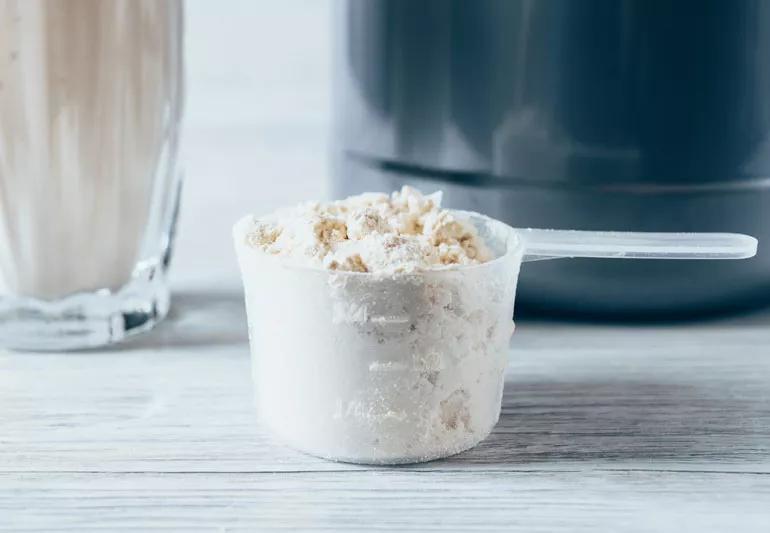Dumping dry protein powder in your mouth is dangerous — and maybe even deadly

Image content: This image is available to view online.
View image online (https://assets.clevelandclinic.org/transform/c84773ea-5110-4557-9761-d7615b7467a9/proteinMix-1059674562-770x533-1_jpg)
Scoop of protein powder
If your first lift for a workout involves raising a scoop of dry protein powder to dump in your mouth, it’s time to rethink your routine.
Advertisement
Cleveland Clinic is a non-profit academic medical center. Advertising on our site helps support our mission. We do not endorse non-Cleveland Clinic products or services. Policy
Researchers say the practice known as “dry scooping” qualifies as dangerous — and even potentially deadly. Add it to the list of questionable TikTok trends to explode onto the scene thanks to millions of video views.
Let’s look at the risks with dietitian Kate Patton, MEd, RD, CCSD, LD.
To start, let’s look at what is being scooped: pre-workout powder. Most powders are packed with caffeine and other stimulants, plus various vitamins and nutrients. They’re designed to supercharge your system and provide energy for a workout.
Traditionally, pre-workout powder is added to water and consumed about a half-hour before putting your muscles to the test. Diluting the powder helps pace your body’s absorption of the product. Plus, it’s much easier on the tummy.
Dry-scoopers, however, take a different approach. They fill up a scoop with pre-workout and dump the powder in their mouth. A swig of water can help wash it down. (It is pretty chalky, after all.)
“Apparently, they think they’re noticing some kind of enhanced effect because the powder is absorbed faster,” says Patton.
But that effect comes at a cost.
Dry scooping essentially floods your system with caffeine with one swallow. Your blood pressure and heart rate may skyrocket as your body takes in the stimulant, particularly as you start exercising.
Advertisement
The jolt of caffeine — which could be equivalent to three or more cups of coffee in an instant — could lead to an irregular heartbeat, too. “That sort of rush can cause palpitations,” says Patton.
In April 2021, a 20-year-old who tried dry scooping after seeing it touted on TikTok later posted a video on the social media platform from her hospital bed saying she was treated for a heart attack. (She survived.)
The use of TikTok to promote dry scooping is cause for concern given its reach among teens.
“This may mislead millions of impressionable minors into improper use of pre-workout, which could lead to respiratory or cardiovascular distress and/or death,” according to a study presented at the 2021 American Academy of Pediatrics National Conference and Exhibition.
Other risks of dry-scooping include:
“There is potential for a lot of harm,” says Patton. “If you’re going to use pre-workout powder, follow the directions and take it with water. You’ll still get the beneficial effects — just not as fast.”
Used correctly, it can be a useful tool for athletes in an intensive training program, says Patton. She emphasized, however, that the same basic results can be achieved through what you put on your plate.
“I’m not a believer, really, in using pre-workout,” she says. “Food is fuel and can give you all of the energy you need.”
But if you do use a pre-workout powder, Patton offers these recommendations:
And in regards to the last recommendation, that means no dry scooping.
Advertisement

Delivered every Tuesday!
Sign up for our Health Essentials emails for expert guidance on nutrition, fitness, sleep, skin care and more
It's a letter about the news!
Learn more about our editorial process.
Advertisement
The supplement shouldn’t replace a healthy diet, but it can help you get in your fruits and veggies
There’s no evidence to prove this supplement can help with weight loss, and it may come with risks
Getting your nutrition from your food is a safer route
Steer clear of restrictive trends and supplements; encourage a healthy diet and exercise
Get the facts about the latest TikTok wellness craze
Here’s a tough pill to swallow: They almost certainly don’t
Learn about the benefits and risks of this popular protein supplement
Manufacturers don't have to prove benefit or disclose risk
Type 2 diabetes isn’t inevitable with these dietary changes
Applying a hot or cold compress can help with pain
Pump up your iron intake with foods like tuna, tofu and turkey